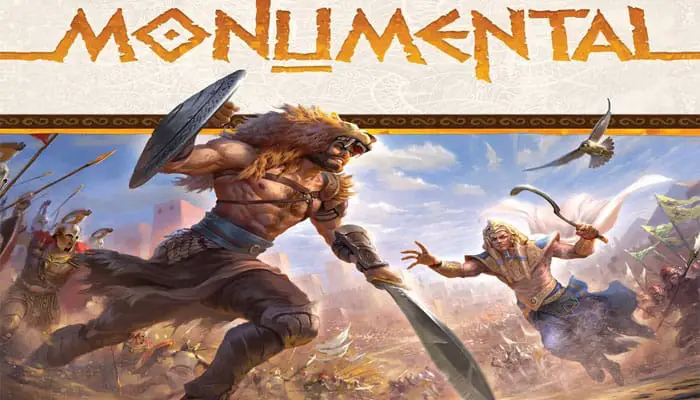
Components

- 105 Civilization cards
- 54 Development cards
- 30 Basic Building cards
- 20 Automa cards
- 24 Hero & Monster cards
- 80 Tiles
- 20 Wonder tokens
- 50 Exploration tokens
- 25 Production tokens
- 20 Market tokens
- 50 Gold tokens
- 20 Culture tokens
- 12 Barbarian/Monster tokens
- 39 Resource counters
- 5 Wonder Construction counters
- 94 Classic Edition Tokens
- 12 Monsters tokens
- 150 Deluxe Edition Figures
Object of the Game
In Monumental, each player leads a unique civilization. How will you shape your destiny, and how will history remember you?
Dare you succeed as a warmonger, as a pioneer of cultural and scientific progress, or an architect of a great city and remarkable Wonders?
The aim of the game is to develop your civilization, by constructing new buildings and wonders in your city, improving your scientific knowledge and +cultural development, and using your military power to conquer new provinces.
The player with the most points wins.
Setup
Map
-
Assemble the map using the correct layout for the number of players from the proposed SCENARIO BOOK. You may also create your own layout.
-
Place Barbarians and Free Town tokens face down, with the number showing.
-
For each Market, choose one set of five tokens with the same City name. Randomly select a number of these tokens equal to the number of Players, returning the rest to the box. Place them as a face-down stack on the board as in the proposed set up.
-
Place one Production token on each tile (except Capital tiles, Water tiles and tiles with a market).
-
Place the unused Barbarian, Free Town, Market and Production tokens in the box. You won't need them during the game.
-
Place all the Gold and Culture tokens beside the play area as a common stock.
-
Place all the Resource counters (Production, Military, Science) and Wonder Construction counters beside the play area as a common stock.
Development Cards
Sort the Development cards by era (I, II, III) and shuffle each era separately. Cards are detailed at the end of the rules.
Then stack these 3 piles into a face-down Development deck.
Put the Modern cards on the bottom, the Medieval cards in the middle, and the Classical cards on top with the Era Separation cards (I, II, III) on top of each of the corresponding Era's cards.
These Separation cards are discarded from the game when revealed. Do not shuffle this deck. Place the Development deck beside the play area.
The game also comes with three alternative Wonders for Eras I, II and III (one for each Era). You may swap each of them for any other Wonder of a matching Era when preparing the Development card stacks.


For a longer game, you can include the Renaissance Era.
To do so, shuffle the 12 Renaissance Era development cards separately, place the Renaissance Era separation card on top of the face-down stack, and insert this stack in between the Era II and Era III cards.
The game has two complementary Modules (Heroes and Monsters) which can be played alone or together to bring more variety in the game. We recommend not to use them during your first plays
Basic Building Cards
Sort the Basic building cards by type (Workshops, Laboratories, Archery Ranges). Place these 3 separate piles in a row face up above the Development deck.
City Set Up
You may choose to play as one of five civilizations: the Chinese, Danish, Egyptian, Greek and Japanese. Each Civilization has a deck with cards common to all civilizations and several specific cards (1 Knowledge card, 1 Warlord card, 1 special Building, 5 Cultural Policies).
Cards are detailed at the end of the rules.

Choose a civilization and take the corresponding components:
- 15 Civilization cards
- 5 Cultural Policy cards
- 1 Warlord card
- 10 Units: 1 Warlord and 9 Soldiers
- 2 Explorers
- 2 Outposts
- 14 colored bases of the same color (Deluxe edition)

Return the components for any unused civilizations to the box. Shuffle your 15 Civilization cards. Deal out a grid of 9 face-up cards in 3 rows of 3 cards: this is your City.
Deal the cards one by one, from the top left corner to the bottom right corner, left to right and top to bottom.
If you deal out a Knowledge card, immediately deal a second card on top of it (overlay the cards so that the effect of the Knowledge card remains visible).

Place your remaining Civilization cards face down beside your City: this is your City deck. Leave space beside your City deck for a discard pile.
Place your Warlord card face up beside your City. Place your Cultural Policy cards face down beside your City: this is your Culture deck. You may look at the cards in your Culture deck at any time.
Take 2 Gold and put them in a supply beside your City.
The player who most recently visited another country becomes the Starting player and takes and keep the Era Separation card I.
Starting from the last player in turn order and proceeding counterclockwise, each player chooses a capital tile.
Place your Warlord and all of your Soldiers and Explorers on your Capital tile. Place your Outposts in a supply next to your Capital tile.

A player full setup includes their City, their Deck, their Gold, their Warlord, their Cultural Policies and their Units (on the Capital Tile)
La Piste De Developpement
Draw the top 6 cards of Development deck. Put them face up in a row beside the deck, to create the Development Display.
 Starting Development Track |
Create your Own Map
You can create your own map with the tiles in the box.
You must follow some instructions:
-
Take 1 Free Town for each player and place them randomly on the map (except on the Capital and Water tiles).
-
Randomly place 1 Barbarian token face up (with the number showing) on the other tiles (except Water tiles and Capital tiles).
-
The value of the Barbarian tiles surrounding each Capital tile must be the same for each player (value 1 or 2 only).
-
Place 1 market per player randomly on the board. For each market, take as many tokens as there are players and place them in a face-down stack on the Market token. e.g. In a 3-player game you'll have 3 Market tokens with 3 tokens on each.
-
Place 1 Production token on each tile except Water tiles and tiles with a market.
Game Play
The starting player goes first. Players then take turns clockwise.
On your turn, complete the following four phases in order:
- Activate City
- Take Actions
- Replenish City
- Replenish Display
1. Activate City
When you activate your City, choose one complete row and one complete column of cards to use this turn. Declare the cards you are activating to the other players, and rotate each activated card by 45 degrees.
If you activate a card attached to a Knowledge card, you activate both the Knowledge card and the card dealt on top of it.
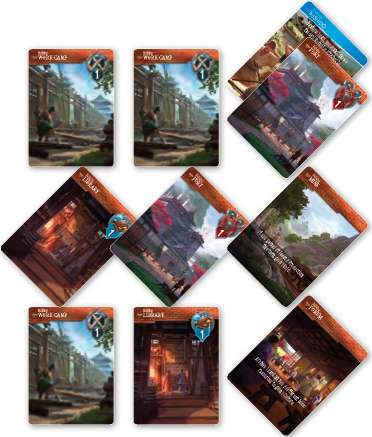
An activated City (with an activated line and column here, a Knowledge Card has been activated along the Building it is attached to).
You immediately gain the resources that are shown in the top right corner of each activated card.
Effects on activated cards can be used in phase 2 of your turn: Take Actions.
Basic Resources
There are three basic resources: Production, Science and Military.
Production is used to build Buildings and Wonders. It can be gained by cards, by the Production tokens on the map, by Market tokens and by Free Town tokens.
Science is used to acquire new Knowledge cards. It can be gained by cards, by Market tokens and by Free Town tokens.
Military is used to move Units (inside your Provinces or to conquer) and Explorers. It can be gained by cards, by Market tokens and by Free Town tokens.
During your turn, when you gain Production, Science and Military resources, take the corresponding counters from the common stock and place them in a personal supply beside your City.
You must use the Production, Science and Military resources you gain on the turn in which you gain them: basic resources cannot be saved for later turns and any unused basic resources are lost, and the Resource counters are placed back in the common stock at the end of your turn.
When you gain Production or Market tokens from the board place them in a personal supply beside your City. You may use them during your turn or in a later turn.
Additional Resources
There are two additional (non-basic) resources: Culture and Gold.
Culture is used for acquiring Cultural Policies.
Gold can be used in place of any basic resource (Production, Science or Military), but not in place of Culture.
When you gain Gold or Culture, take the matching tokens from the stock and put them in your personal supply. You may use them at any time during the current or any later turn.
2. Take Actions
You may take any number of the following actions in any order and combination you want as long as you have enough resources.
Unless the text of a card says otherwise, the effect of a card can only be used once during the turn it is activated.
If you gain the effect of your Warlord and a Barbarian or a Free City token at the same time, you may choose in which order to resolve the effects.
You may look through your own discard pile, but not another player's discard pile.
The following actions can be performed :
- Acquire Development card or Basic building
- Complete a Wonder
- Develop Cultural Policy
- Conquer Province
- Military maneuver
- Construct Outpost
- Play Explorers
- Use the effect of an activated card in your City or active Cultural Policy
- Scientific progress
Remember: You may use Gold in place of a basic resource (Production, Science or Military), but not in place of Culture.
Remember:Return unused Basic Resource counters to the common stock at the end of your turn.
Acquire Development Card or Basic Building
In order to enhance your City, you can obtain new Building, Knowledge or Wonder cards, either from the Development display or from the stock of Basic Building cards.
The cost to acquire a card is shown on its bottom left corner.
-
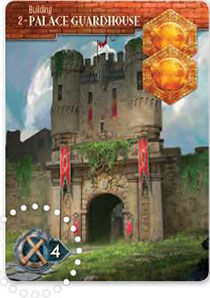
Building Card
When you acquire a Building card (Basic Building or Building from the Development display), pay the cost in Production shown on the card.
Then take the card and place it on top of your deck face-down.
You can acquire a Basic Building card while cards of that type remain in the stock.
-
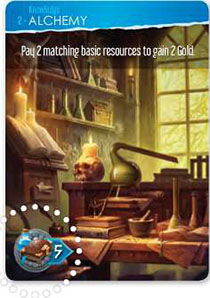
Knowledge Card
When you acquire a Knowledge card from the Development display, pay the cost in Science shown on the card.
Then take the card and place it on top of your deck face-down.
-
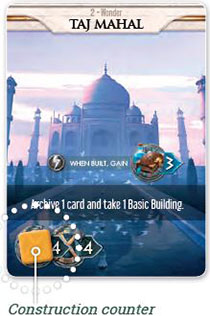
Wonder Card
When you acquire a Wonder card from the Development Display, pay the cost in Production shown in the left-most circle on the card.
Place the card beside your city and place a Wonder Construction counter over the left-most circle. You have built the first stage of the Wonder.
Important: You may only work on building a single Wonder at any one time. If you acquire another, you must choose which one to keep. Remove the other card from the game.
Complete a Wonder
You may complete a Wonder you have previously begun constructing by paying the cost in the rightmost circle at the bottom of the card.
You may acquire and complete a Wonder in the same turn.
When you complete a Wonder, immediately gain the completion bonus shown on the card (taking resources as necessary). Place the Wonder card on top of your deck. Return the Construction token to the common stock.
Then take the matching Wonder token and place it on a province you control, including your Capital tile. You may have only one Wonder per Province/Capital. Wonders add 2 the defense value of the Province.
If you cannot place the Wonder token (because your Capital and all Provinces you control already contain a Wonder), then you cannot take this action to complete a Wonder.
Develop Cultural Policy
Developing Cultural Policies gives you new actions or capacities.
You may develop a Cultural Policy card of your choice from your Culture deck by paying Culture tokens from your personal supply. The amount of Culture tokens paid increases as you develop more policies. Your first Cultural Policy costs 1 Culture, the second Policy costs 2 Culture, and so on.
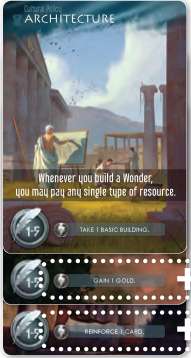
When you develop a Cultural Policy, place the chosen card face up beside your city. Immediately gain the One-off effect of the card (shown on the bottom of the card).
Cultural Policy cards provide you with an ongoing effect, which remains active until you develop another Policy.
When you develop another policy, place the new Cultural Policy card face up on top of the previous Policy card, keeping just the bonus of the previous Policy card visible.
When you develop a new Cultural Policy, also immediately gain the bonuses on all previously developed Policy cards.
Conquer Province
At the beginning of the game, you have 10 Units (1 Warlord and 9 Soldiers) on your Capital tile. Your Explorers do not count as Units.
You may attack any Province tile which is adjacent either to your Capital or to any Province tile you already control by paying Military resources. You may move ONE Unit into the attacked Province for each Military resource you pay.
You must move into the attacked province a number of Units equal to the defense value of the Province (depending on the type of province attacked).
These units can come from any Province (including your Capital) as long as they can reach the attacked province by moving through Provinces you control.
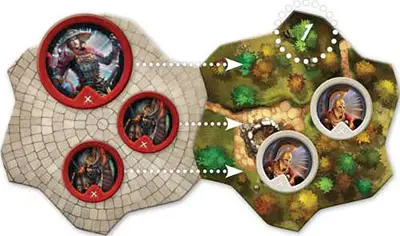
The Japanese player (red) must use 3 Military Units to conquer the Greek's province (white) because of its defense value of 3 (terrain value = 1, number of units = 2).
If some of your Units are in a Province tile that is cut off from other Provinces you control (for example, by a Province controlled by another player), those units can only be used in conquests of Provinces that are adjacent to them or connected through other Provinces you control.
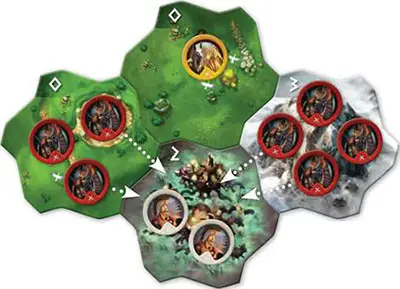
The Japanese player uses units from 2 different provinces to invade the Greek's province that is in the middle.
You may use the same Units to perform several attacks during your turn as long as you pay 1 Military resource for each Unit each time it is used for an attack.
You may NEVER move your Units in such a way that a Province you control (with the exception of your Capital Tile) is left with none of your Units or Outposts on it.
You may not attack Water tiles or another player's Capital Tile. You control a province as long as you have at least one Unit or Outpost in it.
Conquering a Barbarian Province
The defense value of a Barbarian Province is equal to the terrain value of the Province plus the value of the Barbarian token on it.
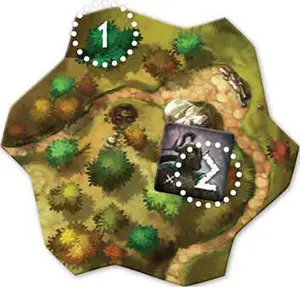
This Barbarian province has a total defense value of 3 (terrain value = 1, Barbarian Token value - 2).
Example: If a Barbarian token with defense value 2 is on a Province with a terrain value of 1, the cost to conquer it is 3 Military resources.
When your conquer a Province with a Barbarian token:
- Move into the attacked province a number of Units equal to the total defense value of the Province.
- Take the Barbarian token and immediately choose one of the two benefits shown on the back of the token. Keep this token face up beside your City.
Conquering a Free Town Province
The defense value of a Free Town Province is equal to the terrain value of the Province. You must also pay the resources shown on the Free Town token.
Example: If a Free Town token with Science value 2 is on a Province with a terrain value of 1, the cost to conquer it is 1 Military and 2 Science.
When you conquer a Province with a Free Town token:
Move into the attacked province a number of Units equal to the terrain value of the Province.
Pay the required resources.
Take the Free Town token and immediately choose one of the two benefits shown on the back of the token. Keep this token face up beside your City.
Conquering an Opponent's Province
You may wish to conquer a Province controlled by another player.
The cost in Military resources is equal to the terrain value of the Province plus the total defense value of all Units and Structures in the Province.
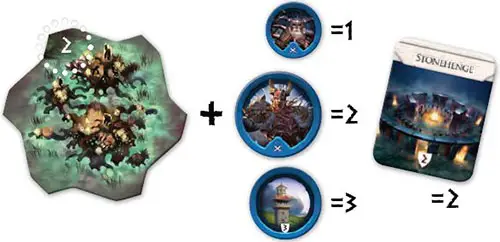
Example: A Province with a terrain value of 2 which has 3 Soldiers and a Warlord on it has a total defense value of 7 (2+1+1+1+2)
When you conquer an opponent's Province:
- Move into the attacked province a number of Units equal to the total defense value of the Province.
- The opponent returns all of their Units to their Capital tile. They also return any Outposts on the conquered tile to their supply.
Moving your Warlord
Each time you wish to conquer a Province, you may choose your Warlord as one of the units required to move into the attacked Province. If you do, once each turn, you immediately gain the benefit on your Warlord card.
Warlord add 2 the defense value of the Province.
Military Maneuver
Military Maneuver is the capacity to Move as many Units as you can inside the Provinces you already control.
By spending ONE Military resource you may move ONE Unit (Soldier or Warlord) from one Province to another Province, as long as you control both Provinces, and they are connected to each other through Provinces you control.
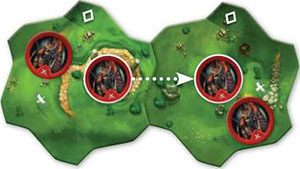
This player may spend 1 Military to move one unit from the left province to the right province, as they control both of them.
Construct Outpost
At any time in your turn, you may construct an Outpost for free. To do that you must have 3 or more Units (Soldiers or Warlord) on a Province. Return 3 Units from the Province to your Capital tile and place one of your Outposts from your supply onto the Province.
You must follow certain restrictions:
- You may only have one Outpost per Province
- You may only have 2 Outposts at any one time.
- Once built, an Outpost cannot be moved.
Outpost add 3 the defense value of the Province.
Important: If a province you control with an outpost is conquered by another player then the outpost is returned to your personal supply.
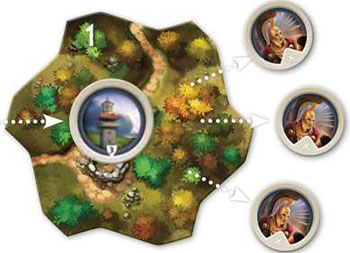
Replacing 3 units with an Outpost (units go back to the player's supply).
Play Explorers
Explorers are used to collect resources from the map.
Pay one military resource to move one of your Explorers to an adjacent Province, regardless of who controls it. An Explorer can move multiple times in a single turn, as long as you pay one Military resource each time.
Each turn, each of your Explorers may perform ONE of the following two actions:
If your Explorer is in a Province with a Market, you may take the Market tokens, look at them, and select one to keep, placing it face up in your personal supply. Return the other tokens face down to the Province. You can only have ONE Token from EACH Market in the entire game.
Take a Production token from the Province your Explorer is currently in and place it in your personal supply.
The Market or Production tokens gained can be used this turn or saved for a later turn but remember that any Basic resources gain when using a token must be used that turn or they are lost.
Place used Market tokens face down, but do not discard them, as they remind you of which Markets you have already taken tokens from.
Important: As an Explorer is not a Unit, they can't conquer or control a Province.
Use the effect of an activated card in your city or active cultural policy
Some cards have effects that are always active or take place whenever another effect occurs (as detailed in the card's text). These are static effects and are considered to be active as long as the card has either been activated in your City this turn, or is your active (topmost) Cultural Policy card.
Choose one card in your City that you activated this turn, or an active Cultural Policy, and use its effect. Unless otherwise specified, each card can only be used once during your turn.
Example: Warrior Culture (a Danish Policy) states 'Spend 2 Military to gain 1 Culture. Gold cannot be used.'If this policy is your active (topmost) policy you may use its effect once on your turn, at any time.
It is never mandatory to use an effect.
Scientific Progress
Pay 2 SCIENCE to draw and use the top card of your deck. Once you resolve all of its effects, discard the card.
3. Replenish City
Add New Cards
After you complete your actions, pick up all of the cards you activated in your City and put them into your discard pile.
Deal out new cards from your City deck to fill the gaps in your City. Always deal new cards one by one, filling the spaces in your grid from left to right, and from top to bottom.
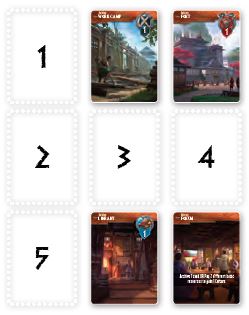
Once the activated cards are discarded, the player draws as many cards as necessary from their deck, and places them in their City (left to right, top to bottom).
If you deal out a Knowledge card, immediately deal a second card on top of it (overlay the cards so that the effect of the Knowledge card remains visible).
If you deal out multiple Knowledge cards for the same space then choose one of the Knowledge cards to keep and discard the others.
Shuffling your Discard Pile
If you ever need to draw or deal out a card from your deck but it is empty, shuffle your discard pile and place it face down as your new deck.
If your discard pile is also empty, simply leave any remaining spaces in your City grid unfilled. This may cause a Knowledge card to have no Building or Wonder card attached to it. In this case, the Knowledge card remains in your City and can be activated by itself.
In the rare case that you only have Knowledge cards in your discard pile, do not shuffle them, and leave any remaining spaces in your City Grid unfilled.
4. Replenish Display
If you acquired at least one card from the development display during your turn, shift the remaining cards to the right to fill the gap. Then deal new cards from the deck up to 6, no matter which Era it is.

All remaining cards from the Development Track are moved to the right. New cards are drawn to replace them (up to 6 cards).
If you acquired no cards from the development display, take the card furthest from the Development deck and place it in a discard pile. Shift the remaining cards to the right away from the deck and deal one new card to fill the gap on the left.
Important: Replenishing is only done at the end of the Turn. Do not fill the gap during the Turn.
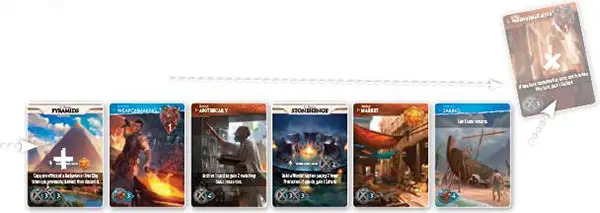
The rightmost card is discarded. The other cards are moved to the right. A new card is drawn to replace the discarded card.
End of the Game
The end of the game is triggered when the last card of the Development deck is dealt into the Development Display at the end of a player's turn.
Play continues until the player seated to the starting player's right has taken a turn. Then all players take one additional and final turn. That way, all players have played the same number of turns.
If the end of the game is triggered at the end of the turn of the player seated to the right of the start player, then each player simply gets one additional and final turn.
Each player scores points for their achievements as follows: (tableau ?)
- Each knowledge card: 1 point
- Each wonder card: 2 points
- Each cultural policy developed: 2 points
- Each province controlled: 1 point
Archived cards do not count towards a player's score, and neither do the starting Knowledge cards of a civilization.
Dominance
In addition, the player who has the highest achievement in each of these four categories:
- Most knowledge: 3 points
- Most provinces: 3 points
- Most wonders: 3 points
- Most cultural policies: 3 points
If two or more players are tied for the greatest achievement in any category, all tied players receive 3 points.
The player with the most points wins.
If there is a tie, the tied player with the most remaining Gold wins. If there is a still a tie, the tied player with the most remaining Culture wins. If there is a still a tie, all tied players share victory.
Continue Reading